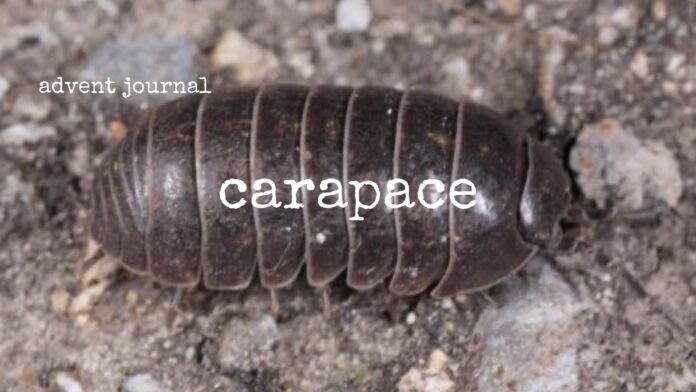I love learning new words, so today was a good day.
I began reading If You Should Fail: Why Success Eludes Us and Why It Doesn’t Matter by Joe Moran, who is one of my favorite writers. He also authored my favorite book on writing, First You Write a Sentence: The Elements of Reading, Writing . . . and Life.
The book opens with a description of the “rough sleeper” who inhabits the doorway across the street from his university office. Moran notices, among other things, that the man reads even as he lives on the street, which gives him a sense of connection with this one experiencing homelessness, and makes him realize only a few circumstances separate one life situation from the other. Then, on Page 3, this sentence–and the new word:
Watching that rough sleeper, it struck me how flimsy the carapace of competence that makes us feel like paid-up members of the human race.
I have a habit of writing in the margins of books I read, so I was quick to underline and then rewrite “carapace of competence,” first because of the rhythm and alliteration when I both read them and then said them out loud. One of the reasons I love reading Moran is the musicality of his prose. He knows how to craft a melody with words. Actually, what I first wrote in the margin was “carapace of confidence,” but I’ll come back to that.
Our friend Mandy was visiting this weekend and she was sitting on the couch reading her own book. I read the sentences to her and we both admitted we didn’t know what a carapace was, so she looked it up.
car·a·pace
/ˈkerəˌpās/
noun
noun: carapace; plural noun: carapaces
the hard upper shell of a turtle, crustacean, or arachnid.
“the study found oil in the carapace of twenty-nine sea turtles that returned to feed in the spill area”
something regarded as a protective or defensive covering.
“under her carapace of self-confidence she was very sensitive to criticism”
I listened to the definition and then went back to Moran to read the sentence again, which was when I realized I had read confidence instead of competence. What I heard in his use of the word was the shell we think will protect us is not quite as reliable as we think it is, which made me think that was true for both competence and confidence.
I have a document where I keep a list of phrases I have heard that are evocative, much like “carapace of competence.” One of them is “delusions of adequacy.” The two phrases make decent companions. For a good many of us, competence has a veneer-like quality. I don’t mean we aren’t skilled or that we aren’t telling the truth. I mean, like Moran, when it comes to seeing those whose shells have been stripped away, we must face the reality that both the competence and the confidence that keep us from sharing their plight are like a lobster shell and less like Batman’s shields.
What Moran is talking about is more layered than having a bed to sleep in and a door to lock. A couple of pages later he talks about the “human hunger for stories, the need to turn life into allegory,” and goes on to say, “Behind this fallacy . . . lies the illusion of control. We need to feel that we have some say over the unseeable course of our lives.”
The carapace of control is not all it’s cracked up to be either.
An allegory, as you know, is a story with a lesson, a moral–tortoise and hare kind of stuff. When the stories of our lives get distilled into such tales, we quit telling the truth. To look back and say, “If I had not persevered when that (bad) thing hadn’t happened, I wouldn’t be in this (good) position today,” or, “I worked hard in the face of adversity and I was rewarded for my efforts,” doesn’t mean God or anyone else was rewarding our competence or confidence. We are not masters of our own destiny, we are people doing the best we can with what we have–or at least trying to do so.
Perhaps I am illustrating the point that the stories that make up our lives, both big and small, don’t necessarily come to a conclusion with a lesson to learn by getting to the end of this post and not having a strong finishing statement. What I mostly wanted to say was I learned a new word today and it made me think about life, stories, vocabulary, and all the things that draw us together and also tear us apart as I meandered through the details of my day wishing I could tell someone what I had learned.
Thanks for being here.
Peace,
Milton
